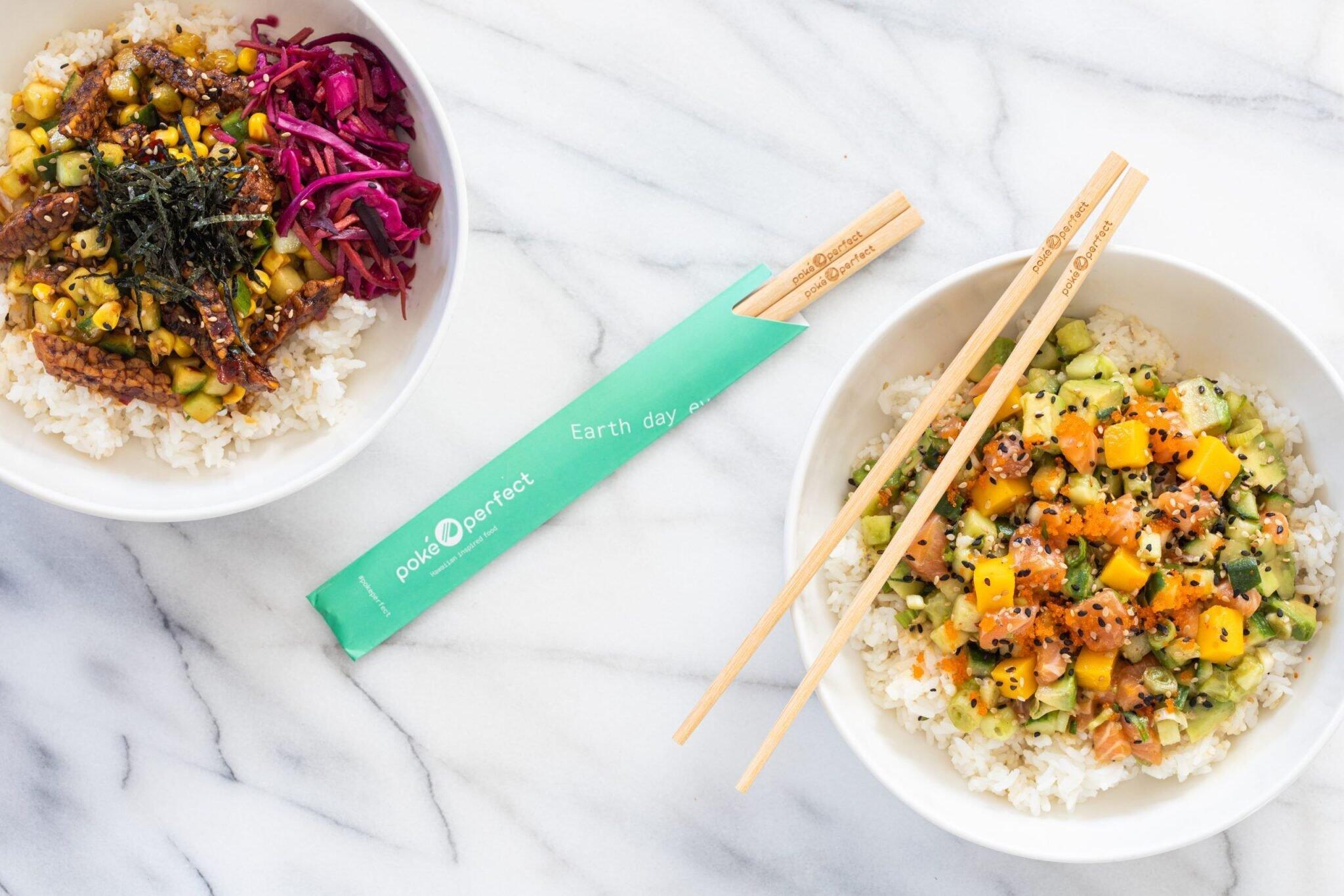Sustainability remains a hot topic for hospitality businesses, prompting questions about management strategies and entrepreneurial challenges. In our exploration, we delve into the experiences of Quinta Witzel, co-owner of our client Poké Perfect. Pioneering the fast-casual healthy food scene with their introduction of poke bowls in the Netherlands, Poké Perfect now boasts branches in nine cities. Quinta and her brother Gerrit Jan leverage AI and other tools to optimise sustainability within their operations. However, their journey is not without hurdles; 'The surcharge on disposable packaging was a major fiasco.'
In 2016, Quinta and Gerrit Jan Witzel launched their first Poké Perfect venue, marking the Netherlands' introduction to the poke bowl—a delectable Hawaiian dish featuring rice, veggies, and fish. Boasting a trifecta of healthiness, speed, and flavour, it swiftly captivated the palates of health-conscious urbanites, establishing Poké Perfect as a go-to destination. Its appeal extends beyond the culinary realm; from its inception, Poké Perfect has prioritized sustainability. By locally sourcing ingredients and offering reusable sustainabowls (crafted from glass), they minimize environmental impact. Behind the scenes, Quinta and Gerrit Jan continuously pursue innovative green initiatives, with 2024 seeing the implementation of numerous eco-friendly changes. We asked about their ongoing innovations and the challenges they face on their sustainability journey.
Regional products and sustainabowls. Tell us all!
‘Incorporating regional products and sustainabowls has been integral to our business strategy since day one. Sustainability has been a core value for us from the outset. For instance, we prioritise seasonal ingredients in our bowls and procure quinoa from Flevoland. Additionally, we've championed the use of reusable glass bowls since our inception, a move that inadvertently pre-empted the challenges surrounding disposable packaging surcharges, which turned out to be a significant setback. While such initiatives are conceptualised with good intentions, the swift implementation required of entrepreneurs often undermines their effectiveness. Despite the relaxation of these regulations, we continue to uphold our commitment to discouraging disposable packaging. However, we believe there are more effective methods for driving change. For example, we offer reusable bamboo chopsticks and soy sauce for a nominal fee, thereby reducing waste from single-use packaging and utensils.
You've made significant progress in recent years.
‘That's correct. In 2022, we introduced climate labels so that customers can see the amount of CO2 emissions involved in producing our dishes. The food industry accounts for more than a quarter of global CO2 emissions. Although Poké Perfect's dishes already emit 44 percent less emissions than the global meal average, we aim to go further. By detailing the CO2 emissions per bowl, we aim to raise awareness among our customers about their choices. It's not about being overly critical, but rather about providing insight and transparency. This insight also allows us to make different choices. For example, the emissions associated with sourcing quinoa from Peru are quite alarming. Luckily, we've been sourcing it from Flevoland since the beginning, although I wasn't aware of that initially. Another example is sushi rice. Do you source it from Japan, or do you choose a closer option like we do from Italy? Unfortunately, not all our ingredients offer this choice. We import seaweed flakes and nori from Japan because there isn't a better option available in the Netherlands, at least not one that's cost-effective. If there are any seaweed producers who offer competitive prices, I'd love to hear from them!’
Sustainability comes with financial implications. How do you maintain profitability while upholding your environmental goals?
‘As it happens, we've recently introduced a new, more sustainable paper bag that's actually cheaper to procure than its predecessor. It's not often that a sustainability initiative ends up costing less; usually, it's the other way around... Nonetheless, we're constantly scrutinising all our processes through a sustainability lens. It's a perpetual challenge because we must stay financially viable. For instance, I recently came across algae-infused paper from Notpla. It's incredibly biodegradable and fantastic, but unfortunately, it's also prohibitively expensive. Sometimes, it takes time before we can afford and implement something. These are gradual discoveries, and it may take a while before you see them in your store or company. Introducing a new bag, for instance, typically takes at least six months. These are lengthy processes where mistakes can happen, alongside the associated costs. I find it fulfilling to work on these initiatives personally, but at times, there are things we desire but can't immediately afford. Take algae-made paper, for instance... The cost factor is indeed a challenge because we can't always pass on the expenses of our sustainable initiatives to our customers, especially not now.’
Why not now, specifically?
‘Life has become expensive for everyone, including entrepreneurs, so nobody wants even higher prices. And those government regulations don't help either. The surcharge on disposable packaging, deposit on cans... The latter is a good idea in theory, but it's not effective. It's resulted in a mess on the streets like never before. It doesn't make sustainable living cheaper or easier. Achieving profitability while prioritising sustainability requires a delicate balance. The entire market is geared towards cheap, fast food. Sustainable products are often more expensive and produced on a smaller scale.’
Is it why being frugal is increasingly crucial?
‘We're constantly striving towards that goal. Collaborating with the Too Good To Go app helps us tackle food waste, and we've recently initiated a pilot programme using AI to predict turnover based on data. This system enables us to procure more accurately, reducing waste and allowing us to allocate staff where they're most needed. It's a win-win situation.’
If you're interested in learning more about Poké Perfect's sustainable initiatives, visit pokeperfect.nl/duurzaam.


